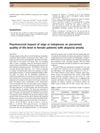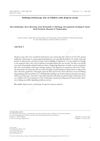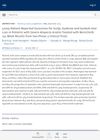 13 citations,
April 2016 in “Journal of Dermatology”
13 citations,
April 2016 in “Journal of Dermatology” 308-nm excimer light therapy helped over a third of treatment-resistant alopecia universalis patients regrow most of their hair.
 214 citations,
September 2015 in “Stem Cells Translational Medicine”
214 citations,
September 2015 in “Stem Cells Translational Medicine” Platelet-rich plasma injections significantly improved hair regrowth and thickness in patients with hair loss.
 13 citations,
May 2021 in “Plants”
13 citations,
May 2021 in “Plants” The leaf extract of Leea indica may reduce inflammation, dissolve blood clots, and promote hair growth.
 42 citations,
April 2021 in “Journal of clinical pharmacology”
42 citations,
April 2021 in “Journal of clinical pharmacology” Baricitinib helps treat several diseases, including COVID-19, but has side effects and needs careful monitoring.
 9 citations,
December 2012 in “The Journal of Dermatology”
9 citations,
December 2012 in “The Journal of Dermatology” Wearing wigs or hairpieces improves self-esteem, adaptability, and competence in women with alopecia areata.
 July 2023 in “Clinical dermatology review”
July 2023 in “Clinical dermatology review” Intralesional triamcinolone acetonide is better than PRP for treating scalp alopecia areata, leading to faster and more complete hair regrowth.
 25 citations,
July 2017 in “Journal of Stomatology, Oral and Maxillofacial Surgery”
25 citations,
July 2017 in “Journal of Stomatology, Oral and Maxillofacial Surgery” PRP injections help regrow hair, reduce hair loss, and increase hair thickness, but effects decrease without ongoing treatment.
29 citations,
February 2011 in “PloS one” Astressin-B can reverse and prevent hair loss in stressed mice.
 February 2024 in “Curēus”
February 2024 in “Curēus” Regional nerve blocks are better than ring blocks for pain relief during PRP hair treatment.
 December 2024 in “IntechOpen eBooks”
December 2024 in “IntechOpen eBooks” Trichoscopy helps diagnose and track alopecia areata by examining specific hair and scalp markers.
 4 citations,
January 2022 in “Transfusion Medicine and Hemotherapy”
4 citations,
January 2022 in “Transfusion Medicine and Hemotherapy” Platelet-Rich Plasma (PRP) has potential benefits in plastic surgery, especially for skin grafts, wound healing, hair loss, mild Carpal Tunnel Syndrome, and TMJ disorders, but more research is needed to confirm its effectiveness.
42 citations,
June 2019 in “Aging” 3,4,5-tri-O-caffeoylquinic acid promotes hair growth by activating the β-catenin pathway.
 April 2018 in “bioRxiv (Cold Spring Harbor Laboratory)”
April 2018 in “bioRxiv (Cold Spring Harbor Laboratory)” Certain small molecules can help regrow hair by turning on the body's cell cleanup process.
 1 citations,
April 2017 in “Journal of Investigative Dermatology”
1 citations,
April 2017 in “Journal of Investigative Dermatology” Tofacitinib may help regrow hair in severe alopecia areata, but results differ greatly between people.
 September 2018 in “The Medical Journal of Cairo University/The Medical Journal of Cairo University”
September 2018 in “The Medical Journal of Cairo University/The Medical Journal of Cairo University” Polarized light therapy helps hair regrowth in alopecia areata patients.
 47 citations,
December 2019 in “Frontiers in immunology”
47 citations,
December 2019 in “Frontiers in immunology” A new mutation in the STING protein causes a range of symptoms and its severity may be affected by other genetic variations; treatment with a specific inhibitor showed improvement in one patient.
 20 citations,
December 2019 in “The journal of allergy and clinical immunology/Journal of allergy and clinical immunology/The journal of allergy and clinical immunology”
20 citations,
December 2019 in “The journal of allergy and clinical immunology/Journal of allergy and clinical immunology/The journal of allergy and clinical immunology” Blocking IL-12/IL-23 does not help with hair loss in alopecia areata for mice or humans.
 28 citations,
December 2017 in “Lasers in Medical Science”
28 citations,
December 2017 in “Lasers in Medical Science” Monochromatic light devices, especially the 308-nm excimer laser, are promising for treating alopecia areata but more research is needed.
 10 citations,
January 2018 in “Postępy Dermatologii i Alergologii”
10 citations,
January 2018 in “Postępy Dermatologii i Alergologii” Treating alopecia areata every 3 weeks with diphenylcyclopropenone is more effective than weekly treatments.
 November 2023 in “Clinical, Cosmetic and Investigational Dermatology”
November 2023 in “Clinical, Cosmetic and Investigational Dermatology” Saw palmetto extract reduced hair loss and improved hair growth in people with hair thinning.
 March 2024 in “International Journal of Dermatology”
March 2024 in “International Journal of Dermatology” Baricitinib improved nail condition and hair regrowth in a patient with alopecia and nail abnormalities.
 93 citations,
January 1996 in “Clinical Pharmacokinectics”
93 citations,
January 1996 in “Clinical Pharmacokinectics” Finasteride helps regrow hair and shrink prostate by reducing DHT, with some sexual side effects.
 47 citations,
May 1995 in “Journal of Investigative Dermatology”
47 citations,
May 1995 in “Journal of Investigative Dermatology” Hair follicles in people with alopecia have lower levels of a key blood vessel growth protein.
 September 2024 in “Journal of the European Academy of Dermatology and Venereology”
September 2024 in “Journal of the European Academy of Dermatology and Venereology” Baricitinib effectively reduces hair loss in severe alopecia areata with mild side effects.
 June 2024 in “Frontiers in pharmacology”
June 2024 in “Frontiers in pharmacology” 2-deoxy-D-ribose gel may help regrow hair in cases of hair loss.
 November 2023 in “Laser therapy”
November 2023 in “Laser therapy” Trichoscopy is essential for diagnosing and managing alopecia areata in children.
 September 2024 in “Journal of the American Academy of Dermatology”
September 2024 in “Journal of the American Academy of Dermatology” Baricitinib helps long-term hair regrowth in severe alopecia areata patients.
 1 citations,
June 2021 in “Journal of Cosmetic Dermatology”
1 citations,
June 2021 in “Journal of Cosmetic Dermatology” Enzyme booster SULT1A1 greatly enhances hair regrowth with minoxidil.
 1 citations,
June 2022 in “JAMA”
1 citations,
June 2022 in “JAMA” Baricitinib, a medication taken by mouth, was effective in regrowing hair for people with severe hair loss.
 238 citations,
November 2016 in “Journal of The American Academy of Dermatology”
238 citations,
November 2016 in “Journal of The American Academy of Dermatology” Tofacitinib is effective and safe for severe hair loss, but full regrowth is less likely after 10 years of hair loss.



























